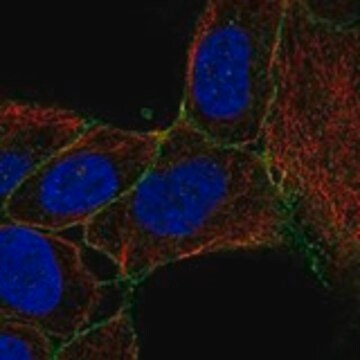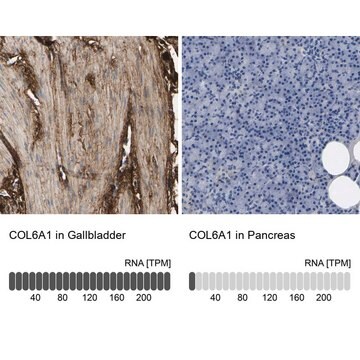HTS130RTA
Ready-to-Assay LPA3 Lysophospholipid Receptor Frozen Cells
Human
Se connecterpour consulter vos tarifs contractuels et ceux de votre entreprise/organisme
About This Item
Code UNSPSC :
41106514
eCl@ss :
32011203
Nomenclature NACRES :
NA.84
Produits recommandés
product name
Ready-to-Assay LPA3 Lysophospholipid Receptor Frozen Cells,
Source biologique
human
Fabricant/nom de marque
Ready-to-Assay
Technique(s)
calcium flux assay: suitable
Numéro d'accès NCBI
Méthode de détection
fluorometric
Description générale
Millipore′s Ready-to-Assay GPCR frozen cells are designed for simple, rapid calcium assays with no requirement for intensive cell culturing. Millipore has optimized the freezing conditions to provide cells with high viability and functionality post-thaw. The user simply thaws the cells and resuspends them in media, dispenses cell suspension into assay plates and, following over night recovery, assays for calcium response.
Lysophosphatidic acid (LPA) is a lysophospholipid produced by activated platelets that inhibits adenylate cyclase and stimulates DNA synthesis, changes in cell morphology, and increases in intracellular calcium in a variety of cultured mammalian cells. A family of three GPCRs, LPA1, LPA2 and LPA3, mediates the biological effects of LPA (Contos et al., 2000). LPA3 is expressed primarily in testes, prostate, heart and pancreas. Mice lacking LPA3 have low expression of uterine COX-2 and display decreased uterine implantation and embryo spacing (Ye et al., 2005). Millipore′s cloned human LPA3-expressing cell line is made in the Chem-1 host, which supports high levels of recombinant LPA3 expression on the cell surface and contains high levels of the promiscuous G protein Gα15 to couple the receptor to the calcium signaling pathway. Thus, the cell line is an ideal tool for screening for agonists, antagonists, and modulators at LPA3.
Lysophosphatidic acid (LPA) is a lysophospholipid produced by activated platelets that inhibits adenylate cyclase and stimulates DNA synthesis, changes in cell morphology, and increases in intracellular calcium in a variety of cultured mammalian cells. A family of three GPCRs, LPA1, LPA2 and LPA3, mediates the biological effects of LPA (Contos et al., 2000). LPA3 is expressed primarily in testes, prostate, heart and pancreas. Mice lacking LPA3 have low expression of uterine COX-2 and display decreased uterine implantation and embryo spacing (Ye et al., 2005). Millipore′s cloned human LPA3-expressing cell line is made in the Chem-1 host, which supports high levels of recombinant LPA3 expression on the cell surface and contains high levels of the promiscuous G protein Gα15 to couple the receptor to the calcium signaling pathway. Thus, the cell line is an ideal tool for screening for agonists, antagonists, and modulators at LPA3.
Description de la lignée cellulaire
- GPCR Cell Lines
- Host cells: Chem-1
Application
Human LPA3 / EDG7 GPCR frozen cells for Calcium Flux FLIPR Assays.
Actions biochimiques/physiologiques
- GPCR Class: A
- Protein Target: LPA3/ EDG7
- Target Sub-Family: Lysophospholipid
Composants
Pack contains 2 vials of mycoplasma-free cells, 1 ml per vial.
Fifty (50) mL of Media Component.
Fifty (50) mL of Media Component.
Clause de non-responsabilité
This product contains genetically modified organisms (GMO).
Within the EU GMOs are regulated by Directives 2001/18/EC and 2009/41/EC of the European Parliament and of the Council and their national implementation in the member States respectively.
Code de la classe de stockage
10 - Combustible liquids
Classe de danger pour l'eau (WGK)
WGK 1
Point d'éclair (°F)
Not applicable
Point d'éclair (°C)
Not applicable
Certificats d'analyse (COA)
Recherchez un Certificats d'analyse (COA) en saisissant le numéro de lot du produit. Les numéros de lot figurent sur l'étiquette du produit après les mots "Lot" ou "Batch".
Déjà en possession de ce produit ?
Retrouvez la documentation relative aux produits que vous avez récemment achetés dans la Bibliothèque de documents.
Notre équipe de scientifiques dispose d'une expérience dans tous les secteurs de la recherche, notamment en sciences de la vie, science des matériaux, synthèse chimique, chromatographie, analyse et dans de nombreux autres domaines..
Contacter notre Service technique








